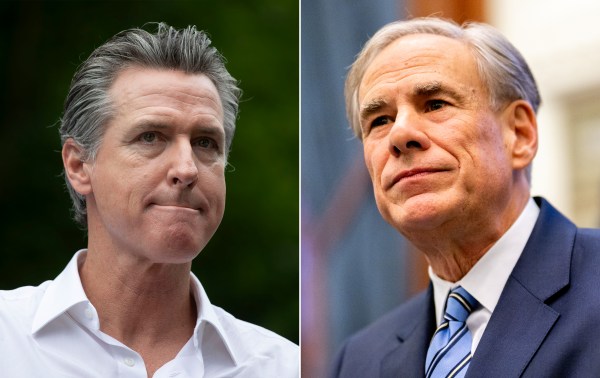Happy Tuesday! The daily coronavirus task force briefings are back, starting today at 5 p.m. ET. “Hooray!” shouted all your Morning Dispatchers in unison.
Quick Hits: Today’s Top Stories
-
The United States confirmed 57,097 new cases of COVID-19 yesterday, with 7.8 percent of the 735,197 tests reported coming back positive. An additional 457 deaths were attributed to the virus on Monday, bringing the pandemic’s American death toll to 140,957.


-
A new vaccine developed by the University of Oxford was found to trigger an immune response in more than 1,000 human patients participating in a trial, and all side effects—fever, headaches, muscle aches, and injection site reactions—were only mild or moderate. The vaccine has already entered Phase 3 trials.
-
The GOP’s next coronavirus relief package is starting to take shape after meetings between President Trump and Republican congressional leaders Monday. It will likely come in at around $1 trillion, include a payroll tax cut, and tie school funding to reopening efforts.
-
The European Union announced late last night its 27 member countries had come to an agreement on an $857 billion coronavirus economic recovery package.
-
In response to China’s recent national security law that cracks down on pro-democracy protests in Hong Kong, the United Kingdom announced it will suspend its extradition treaty with the semi-autonomous city, citing concerns that anyone it extradites to the area would be subsequently sent to mainland China.
-
Iran executed Mahmoud Mousavi Majd—an Iranian citizen convicted of spying for Israel and the United States—on Monday. Iran did, however, suspend the death sentences of three other anti-government protesters in the wake of a worldwide social media campaign.
GOP Economic Relief Plan in the Works

Congress is back in session this week, giving lawmakers a narrow window to act before several CARES Act provisions expire at the end of the month and both chambers enter their August recess. President Trump met with top GOP officials in the White House on Monday to discuss what will likely be the final congressional coronavirus relief package this year. No bill has been unveiled yet, but negotiations with Democrats are already looking bleak, and even Republican officials have reservations about the president’s plan to include payroll tax cuts.
Congress has already spent trillions of dollars to keep families and small businesses afloat during the pandemic—and it has largely worked, as Declan wrote in a piece for the site last week. A study by scholars at Columbia University found that without the CARES Act, an additional 12 million Americans could have fallen below the poverty line. But with massive infusion of federal dollars in the CARES Act, the U.S. poverty rate is expected to increase only 0.2 percent to 12.7 in 2020, assuming roughly 63 percent of the population take advantage of the stimulus checks and 14 percent avail themselves of expanded unemployment benefits.
“The CARES Act was quite successful,” conservative economist Michael Strain told The Dispatch. “The goal was to provide a bridge from normal economic times as they were in February to the other side of the shutdown, which is where we are now. We’re no longer shut down, we’re partially reopened. And that bridge needed to essentially replace the revenue that businesses were losing, replace the income that households were losing, and preserve the productive capacity of the economy to the extent possible.”
But the economy isn’t quite ready for stimulus funding to run out just yet and many of the benefits are set to expire soon. A moratorium on the eviction of tenants in federally backed housing or housing financed through federally backed mortgages ends July 25. The boost in unemployment compensation—an additional $600 per week—sunsets July 31. The Paycheck Protection Program—about $500 billion in checks to allow businesses to survive the crisis and continuing to make payroll—ends August 8. Experts from across the political spectrum have warned about the potential withdrawal of these support programs all at once.
Treasury Secretary Steve Mnuchin said in the Oval Office yesterday the eventual bill will “protect Americans that are unemployed,” but added that the enhanced unemployment benefits of the last several months will likely be discontinued. “We’re going to make sure that we don’t pay people more money to stay home than go to work,” he said. “We want to make sure that people who can go to work safely can do so. We’ll have tax credits that incentivize businesses to bring people back to work.”
Monday’s White House press availability also made clear the Trump administration’s focus on including liability protections for in the next relief package. “We don’t need an epidemic of lawsuits on the heels of the pandemic we’re already struggling with,” Senate Majority Leader Mitch McConnell added.
Addressing the Senate, McConnell urged bipartisan support for the yet-to-be-revealed bill. “It would neither be another multitrillion-dollar bridge loan to make up for a totally shut down economy, nor an ordinary stimulus for a nation ready to get back to normal,” McConnell said. “The need now lies somewhere in between.”
It’s early, but don’t hold your breath waiting for that bipartisan comity. House Democrats passed one such “multitrillion-dollar” package—the HEROES Act—back in May; the price tag came in at around $3 trillion, and it would fund state and local governments, boost worker hazard pay, send another round of stimulus checks, and extend current levels of unemployment assistance for Americans. Republicans dismissed the legislation as an “enormous political messaging bill,” and blocked it. Now, Senate Minority Leader Chuck Schumer is promising to return the favor, with seven Senate Democrats needed to move any legislation forward.
But even GOP lawmakers have their reservations with the bill. Several Republicans are wary of including a payroll tax cut because it would slash revenue that is allocated to Social Security and Medicare. “It’s a priority for the president,” said Sen. John Thune regarding the proposal. “We’ll take a look at, see what the consensus, see where the votes are, but I know there’s a lot of skepticism about it in our conference.” Sens. Chuck Grassley and John Cornyn expressed skepticism over the idea as well. Republicans are also lobbying the White House to subsidize coronavirus testing on the state level, and want the bill to include increased funding for the Centers for Disease Control, the Pentagon, and the State Department to confront the virus domestically and abroad. The White House has opposed increased funding for testing and additional money for the CDC and other agencies.
All of this remains very much in flux. We’ll learn more today after the Senate GOP lunch—which Mnuchin and White House Chief of Staff Mark Meadows are expected to attend—and provide an update later this week.
Federal Law Enforcement Agents in Oregon, Explained
If you, like us, saw news over the weekend about unidentified federal agents in Portland, Oregon, rounding up protesters and throwing them in unmarked vans and thought, what the heck is going on, do we have a piece for you. In an explainer over on the site, Charlotte spoke to several people on the ground in Oregon and described what we know—and what we don’t—about the chaos in the Pacific Northwest. Some key excerpts below.
What sparked federal agents to get involved in Portland?
More than 50 straight nights of demonstrations against police brutality and systemic racism involving mostly peaceful protesters, but also vandals targeting government property and violent actors confronting local and federal law enforcement officers. President Trump sent in the “rapid deployment teams” to protect federal property and personnel at the same time he condemned the state’s Democratic leadership for their failure to do so. There have been widespread reports that these teams, dressed in military-like fatigues and driving unmarked vehicles, have been detaining even peaceful protesters.
Interim head of the DHS Chad Wolf released a scathing statement last Thursday about recent violence in Portland and the city government’s inadequate response. “The city of Portland has been under siege for 47 straight days by a violent mob while local political leaders refuse to store order to their city,” the statement reads. “Each night, lawless anarchists destroy and desecrate property, including the federal courthouse, and attack the brave law enforcement officers protecting it.”
Wolf outlined the various crimes committed during the unrest, focusing on property damage, graffiti and broken windows. The protesters—whom Wolf characterized as “violent anarchists”—have set off fireworks, torn down fences, set fires, and even tried to establish an autonomous zone like Seattle’s. Perhaps not surprisingly, the unrest persisted despite substantial concessions by the local government; the city commissioners’ pledged to reduce the police budget by $16 million and police chief Jami Resch resigned last month.
What are Oregon officials saying?
In an interview with NPR, Oregon’s Democratic Gov. Kate Brown called for the removal of federal agents. “The Trump administration needs to stop playing politics with people’s lives. We don’t have a secret police in this country,” she said. “This is not a dictatorship. And Trump needs to get his officers off the streets.”
Portland Mayor Ted Wheeler, a Democrat, mirrored that sentiment—“What they are doing is sharply escalating the situation,” Wheeler told host Jake Tapper on CNN’s State of the Union. “Their presence here is actually leading to more violence and more vandalism. And it’s not helping the situation at all. They’re not wanted here.”
Sens. Jeff Merkley and Ron Wyden (along with two Oregon representatives) drafted a letter to Attorney General William Barr and Wolf, calling on them to remove “paramilitary forces” from Portland: “They are more reflective of tactics of a government led by a dictator, not from the government of our constitutional democratic republic.”
In response to the alleged illegal detainments by agents, Oregon Attorney General Ellen Rosenblum filed a lawsuit against the Department of Homeland Security and other federal agencies Friday to request a restraining order. Rosenblum alleged that the seizures of protesters “violated the constitution by unlawfully detaining and arresting demonstrators without probable cause.”
Is this legal?
There are serious questions about the constitutionality of these actions. The agents potentially violated the protesters’ Fourth Amendment rights against unreasonable searches and seizures, by arresting them without warrant or probable cause. Some individuals forced into the unmarked vans were peaceful protesters and reportedly had no involvement in the protests at all.
Worth Your Time
-
Former Trump administration FDA Secretary Scott Gottlieb’s latest piece for the Wall Street Journal breaks down the testing and data measurement issues in the Department of Health and Human Services and Centers for Disease Control, which led to much of the dysfunction at the federal level surrounding our national coronavirus response. The picture Gottlieb paints is one of bureaucratic stagnation, lack of preparedness, and bad communication, highlighting “the need to treat health security with the same gravity as other threats of national importance.”
-
In New York magazine, Josh Barro offers a grim prognosis: The economy won’t be recovering anytime soon. The “V-shaped” recovery that many had hoped for is “not in the cards,” Barro says. Instead, pointing to a long list of indicators, Barro argues that we should prepare for a prolonged recession. “In the end,” he writes, “the incompetence that has let the virus rage across so much of the country may well cause economic hardships that long outlast the epidemiological ones.”
-
In recent weeks, we’ve talked about the newfound cultural bingo concept of “white fragility”—defined by racism guru and best-selling author Robin DiAngelo as the discomfort felt by white people when forced to consider the ongoing existence of structural prejudice. In his Sunday New York Times column, Ross Douthat examines the concept from a different angle, offering what he sees as an explanation for the American elite’s wholesale adoption of the DiAngelo program and attendant overall obsession with privilege, race, and oppression. The column argues that racism, white supremacy, and “whiteness” more broadly have become catch-all scapegoats for elite anxieties caused by the breakdown of America’s meritocracy and the increasing competition from a growing number of elites for a decreasing set of rewards. The popularity of anti-racist dogma can thus be understood as stemming from this new phenomenon: “The stress and unhappiness felt by meritocracy’s strivers, who may be open to a revolution that seems to promise more stability and less exhaustion, and asks them only to denounce the ‘whiteness’ of a system that’s made even its most successful participants feel fragile and existentially depressed.”
Presented Without Comment
Also Presented Without Comment
Toeing the Company Line
-
The latest episode of Advisory Opinions is a great one: Joined by SCOTUSblog’s Amy Howe, David and Sarah offer a detailed retrospective on the 2019-2020 SCOTUS term and what we learned from it, as well as what we can expect from next year’s slate.
-
Speaking of Sarah, she’s got a new piece up at the site that you should definitely read if you’re a fan of nitty-gritty electoral politics, curling, or curling metaphors about nitty-gritty electoral politics.
Let Us Know
Have you—or someone you know—been receiving CARES Act benefits the past few months, whether in the form of a stimulus check, enhanced unemployment, an eviction moratorium, or a PPP loan? If so, are you (or they) back to work and prepared for these benefits to expire in the coming weeks?
Reporting by Declan Garvey (@declanpgarvey), Andrew Egger (@EggerDC), Sarah Isgur (@whignewtons), Charlotte Lawson (@charlotteUVA), Audrey Fahlberg (@FahlOutBerg), Nate Hochman (@njhochman), and Steve Hayes (@stephenfhayes).
Photograph by Doug Mills/Getty Images.







Please note that we at The Dispatch hold ourselves, our work, and our commenters to a higher standard than other places on the internet. We welcome comments that foster genuine debate or discussion—including comments critical of us or our work—but responses that include ad hominem attacks on fellow Dispatch members or are intended to stoke fear and anger may be moderated.
With your membership, you only have the ability to comment on The Morning Dispatch articles. Consider upgrading to join the conversation everywhere.